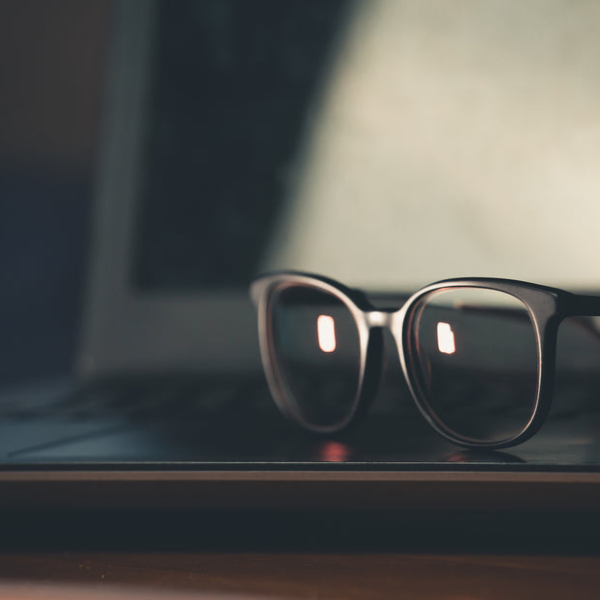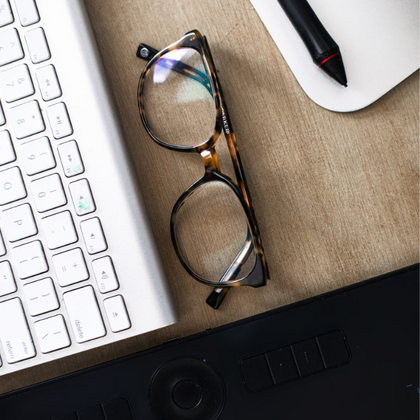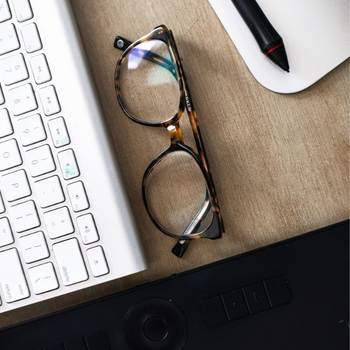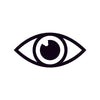

Blue Light Glasses
Whether we want to or not, display screens have become embedded in our daily routine and naturally this has led to curiosity about the effect of screen time on our eyes.
One particular topic that has continued to sway opinion is blue light. Whilst there is ongoing debate regarding the potential harm of blue light exposure, many people still look to reduce its impact on their eyes.
Blue light-blocking glasses have emerged as a popular preventative measure, benefiting eye health and overall well-being.
Are blue light glasses essential? Probably not.
Can they be helpful? Absolutely.
In this article, we’ll address some of the most popular questions regarding blue light glasses, their effectiveness and the options available for non-prescriptive and prescriptive glasses.
What is blue light?
Contrary to popular belief, the most significant source of blue light isn’t your mobile phone or computer. It’s the sun.
Sunlight doesn’t just contain one type of light — it’s made up of an array of coloured “visible” light, such as red, yellow, and blue. Compared with other colours on the spectrum, blue light has a short wavelength, which means it contains more energy.
Aside from sunlight, blue light is also emitted by digital screens. Although the amount produced is substantially less than the sun, they are still a source of artificial blue light and given the time we spend using screens daily, its effects on our eye health have become of increasing concern.
Is blue light exposure harmful to your eyes?
Believe it or not, blue light during daytime hours can be beneficial as it helps regulate our circadian rhythm. Exposure to blue light at appropriate times can increase attentiveness, alertness and mood.
That being said, prolonged and frequent exposure to blue light from an artificial source may have some undesired effects on your eyes and general well-being. One study conducted on animals has shown that blue light can damage cells in the retina, but there is currently no evidence to suggest it damages the human eye.
However, the main drawback of artificial blue light is the disruption it can cause to your sleep cycle. Studies conducted on athletes found that exposure to blue light for more than 3 hours resulted in lower quality and reduced sleep.
Although studies on the effect of blue light on eye health are still inconclusive, there is no harm in taking preventative measures. If we use the analogy of an old boat, it’s always better to keep it well-maintained than to repair holes as they appear out at sea.
How does a blue light filter work?
Blue light filters are usually a type of coating applied to the lens and work by absorbing or blocking a portion of the blue light that passes through the lens.
A randomised clinical trial showed that using blue light-blocking lenses 2 hours before bed each day increased sleep quality in patients with insomnia.
What options are available for blue light glasses?
1001 Optometry offers an extensive range of options for blue light glasses in both non-prescription and prescription glasses.
Premade blue light glasses
For those who may not typically require glasses, but feel the need to reduce eye strain while using their devices, 1001 Optometry offers a fashionable series of non-prescription blue light glasses.
Prescription blue light glasses
At 1001 Optometry, we want to provide the highest level of customisation and personalisation to your optical experience. This is why we also provide a range of optional coatings for your glasses on top of the standard anti-reflective or anti-glare coating that lenses generally come with.
Single-vision blue light lenses
With our single-vision glasses, patients can add a UV and blue light-blocking coating to their lenses for maximum comfort during day and night.
Simply select the option upon checkout if you are looking to purchase your glasses online, or find your nearest 1001 Optometry store to speak with our expert staff and try on as many frames as you please.
Progressive or multifocal blue light lenses
Whether you’re looking for a blue light filter on your multifocal or computer glasses, 1001 Optometry offers the highest quality options through our two main suppliers, Essilor and Hoya, including:
- Hoya BlueControl
- Essilor BlueUV
FAQs


While individual experiences vary, some users report reduced eye strain and improved comfort with blue light glasses.
Blue light coatings are often clear or slightly tinted, making them inconspicuous and minimally affecting the appearance of your lenses.
Anti-reflective coatings reduce glare and reflections, while blue light coatings specifically target the absorption or blocking of blue light.
In many cases, an optometrist can retrofit existing glasses with a blue light coating.
Yes, premade blue light glasses are available for purchase without a prescription.


